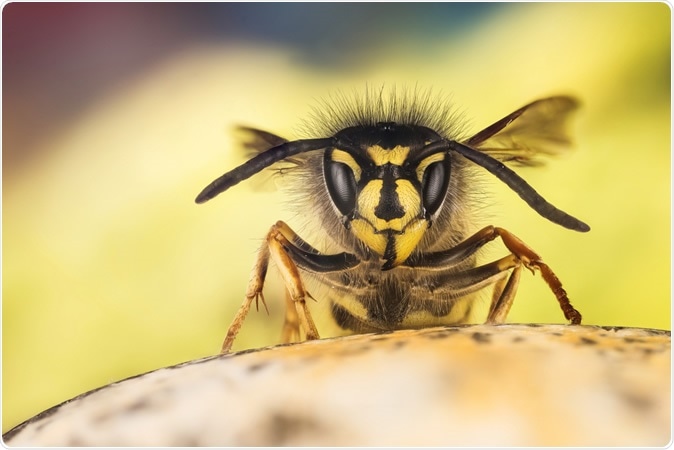Pesticides are widely used to control insect species perceived to be pests and pose a great challenge to the survival of numerous species of insects, the birds that prey on them, and the plants fertilized by them, among other things. Among all pesticides, atrazine is second in terms of volume sold all over the world. Atrazine is known to cause many effects on animals. However, not much is known about how it affects the microbes living inside these animal hosts.

Common Wasp, Vespula vulgaris. Image Credit: Maciej Olszewski
The study
To find out what happens to the gut microbes in animals exposed to atrazine on a continuous or acute manner, at levels not high enough to kill them, the researchers chose a wasp species called Nasonia vitripennis. They exposed the wasps to 300 ppb (parts per billion) of atrazine, which is what pollinators are typically exposed to in a freshly treated field or stream.
They exposed another group to 30 ppb for 36 generations.
A third group exposed to 30 ppb of atrazine was switched to an atrazine-free environment from generation 26 to 35.
They looked at the RNA copies made by the affected wasps, and the resulting proteins that were produced, over 36 successive generations of wasps.
In another experiment, the wasps were raised in a germ-free environment. In a subgroup of these wasps, the gut microbiome of atrazine-exposed wasps was transplanted into the non-exposed group. The presence of atrazine tolerance was looked for in both these groups.
The findings
The investigators found that if these wasps were exposed to 300 ppb of atrazine, they underwent changes in immune function, in the way their mitochondria operate, and their overall behavior.
The first generation of exposed wasps experienced behavioral alterations in the form of a changed gut bacterial population. As a result, the bacteria became more diverse and the overall bacterial numbers became greater. Gut bacterial patterns are inherited from the maternal side.
The researchers found a similar shift in gut microbiome with as little as 30 ppb, in fact. And this change was also heritable.
With this exposure over 36 generations, the rate of death due to this pesticide dropped tenfold, and another remarkable occurrence was noted. Despite not being exposed to another herbicide or weed killer called glyphosate, the wasps also showed immunity to this compound as well.
In the third group, where the wasps on 30 ppb atrazine were put on a diet from which atrazine exposure was conspicuously absent for the next 6 generations, the bacterial microbiome in their gut stubbornly refused to return to the earlier pattern, and clung to the parental pattern.
In atrazine-exposed wasps, a remarkable change was observed in the density of the rare gut bacterial species Serratia marcescens as well as of Pseudomonas protegens. These bacteria break down atrazine, reducing the harmful impact on the wasp. These bacteria were fed to atrazine-unexposed wasps and their tolerance assessed.
Wasps raised in a gut-free environment showed a loss of the previous inherited atrazine tolerance. But when the gut microbiome of atrazine-exposed wasps was transplanted into these non-exposed wasps, they became tolerant to atrazine. This shows that the gut microbiome plays a key role in pesticide resistance in this case via symbio, both to the compound to which it is exposed and to others against which no exposure has occurred so far.
When S. marcescens and P. protegens were fed to non-exposed wasps, they also gained atrazine resistance.
Summary
Investigator Robert Brucker says, “Overall, we demonstrate that resistance to multiple pesticides can arise in a population that is exposed to sub-toxic concentrations, that the microbiome facilitates this resistance, and that it provides resistance against other pesticides to which the host animal has never been previously exposed. This result indicates that the disruption to the microbiome after acute exposure to atrazine is inherited across generations, even after exposure is removed.”
The researchers conclude that constant exposure to atrazine at sublethal doses causes a change in the microbial pattern within the wasp gut. This causes the host to develop resistance as a result of the breakdown of the toxic compound. This is thus a case of high-speed adaptation by the host to the environment via gut symbionts, in order to overcome new toxins.
Implications
Ecologists need to note that such changes in the gut microbiome, which affect the function and can be passed on to successive generations, must be part of the broad-based evaluation of the effect of a pesticide on various forms of life, and as part of the coping strategy as well.
Atrazine-metabolizing genes have also been found in wild bees exposed to this pesticide. This study shows the possibility of similar findings across an array of species for dozens of generations since the pesticide began to be used in the 1950s.
Brucker points out, “Ultimately, these effects could have repercussions on host behavior, metabolic stress, immunocompetence, and host-microbiota regulation.”
The future
The researchers would now like to look into the particular genes that are selected for by atrazine exposure, and their roles in the development of resistance to the toxins and in regulating the microbiome. In addition, they are considering the development of probiotics to protect honeybees against the toxicity of multiple pesticides.
Bacteria could also be used similarly to clean up an oceanic oil spill, as a probiotic in humans exposed to low-level toxins, or to protect humans, plants and animals who are being affected inadvertently by the use of pesticides against other species. They sum up: “Further host-microbiome studies of multi-generational exposure to xenobiotic compounds are needed, especially in light of the increased risk of xenobiotic exposure to humans, plants, animals, fungi, and bacteria across the globe.”
Journal reference:
Cell Host & Microbe, Wang et al.: "Changes in microbiome confer multigenerational host resistance after sub-toxic pesticide exposure" https://www.cell.com/cell-host-microbe/fulltext/S1931-3128(20)30048-2